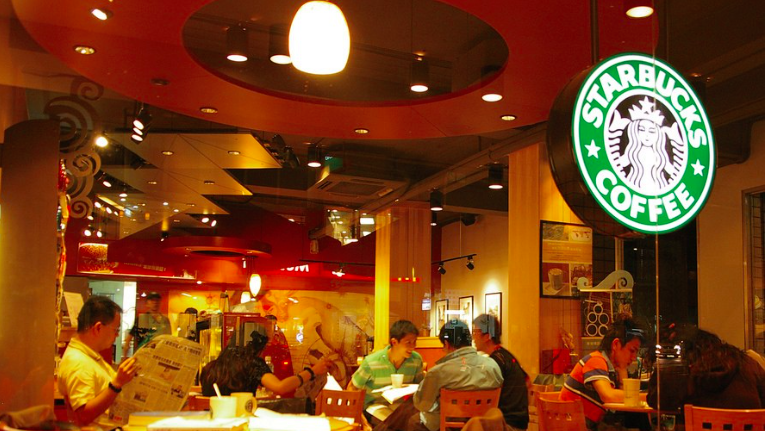Both Starbucks and Pepsi have made such mistakes! The details that excellent store managers and entrepreneurs should pay attention to.

For professional baristas, please follow the coffee workshop (Wechat official account cafe_style)
The manager is the soul of a store. In addition to being adept at in-store affairs, knowing the business strategy of opening a store, and being able to bring and manage people are all the skills that a good store manager needs. However, in the process of daily operation, some decision management processes should be paid special attention to. We have sorted out 8 common myths to remind operators to step on mines by mistake and to help store managers stand firm in the pace of store operation.
1. The fast exhibition store ≠ has an influx of money, be loyal to the brand value.
Excellent store managers will hope that their store performance will be red, open more branches, provide more diversified products, and meet different customer-oriented needs. However, if unrestrained expansion, it may cause market positioning out of focus, blurring the painstaking establishment of the brand image.
In 2008, Starbucks (Starbucks) fast exhibition stores, broke through the 9000 mark, in order to continue to increase the number of stores, stimulate revenue, not only do not care about store decoration, but also diversified operation, into the record entertainment, publishing industry and so on. When customers enter the store, they are confronted with stuffed toys that have nothing to do with coffee, the taste of cheese sandwiches comes from their nostrils, and the quality and taste of coffee gradually become inconsistent.
As a result of these changes, Starbucks has gradually lost loyal customers, which is also reflected in declining store arrivals and profit figures, forcing founder Howard Schutz (Howard Schultz) to return to the pot to take over as CEO.
The first thing he took over to transform Starbucks was to return to the existing market positioning of the brand, stop selling sandwiches, stop publishing branch turnover, let employees get rid of the shackles of performance, and once again turn their attention to coffee, customers, partners, and experiences. deepen customers' understanding of the brand and successfully save the brand image.
two。 It shows that ≠ teaches that people are not talking about it.
"I've taught it many times, but why can't I learn it?" This should be the sentiment of many store managers, thinking that they have tried their best to teach their staff, but have not received any real feedback. "Why do employees leave in a week?" points out that if employees do not show the basic etiquette of advance and retreat, the store manager must reflect.
"explanation" is not equal to "teaching". The so-called teaching should be in line with the staff's ability to set the speed and progress of the explanation; it should also be demonstrated to the staff in person in order, and explain the meaning and importance of each step, so that the staff will not delete the steps on their own. Next, ask the other person to try to do it, and the instructor must watch to identify where the learner needs to improve or which link has gone wrong. In the final evaluation, don't criticize the employees for what they are not doing well, no matter how small the advantages are, praise them first, and then remind each other of the areas that must be improved.
3. Correcting mistakes and correcting ≠ angrily curses others, don't be an emotional store manager
There is another kind of store manager who is angry when he sees the inappropriate behavior of his employees, confuses "reprimand" with "anger" and yells at his employees. On the contrary, it will be self-defeating, and the employees who make mistakes will turn their grievances into dissatisfaction and change their attitude.
"Why do employees leave in a week?" points out that store managers who know how to swear will wait for their anger to subside and then appear in front of employees. When scolding, only comment on the wrong words and deeds or failures, never say personal attacks that negate each other's personality or appearance, nor can you turn over the past and blur the focus.
It is necessary to clarify the cause of the error before there is a chance to correct it. You can communicate in both directions by asking questions: "what do you think you should do if you want to avoid the same mistake?" Guide the other party to find out how to improve. In addition, we should also take into account the face of the employees, find a place to blame one-on-one in private, after scolding, but also timely appease each other: "I'm sure you can do it!" Convey trust in employees.
4. The ≠ of other people's success can be completely copied, and we should learn from the experience of failure.
Whether it is a chain business or a competitive industry, it is necessary to learn from experience and lessons. For successful cases, you can refer to the practice, or by understanding the cases of failure, as a reference, do not repeat.
However, if the store manager or group does not actually share or collect market information, it is possible to make the store make the same mistake. Most fast food brands have done a good job in entering the breakfast market, and Taco Bell, a fast food restaurant in the United States that specializes in Mexican food, also wants a piece of the pie, offering a spicy breakfast with the slogan "can wake you up." but unexpectedly, people didn't like heavy breakfasts and ended in failure.
It is worth mentioning that this is not the first time Taco Bell has tried to sell breakfast. not only did they not first figure out what the customer really wanted for breakfast, but they also did not remember the lessons of the past and offered spicy products to customers again.
And Taco Bell is the same as the American Yum Restaurant (Yum! KFC, a subsidiary of Brands, Inc), has launched a similar breakfast menu in the UK, and the market response has been muted. If Yum can use the advantages of the group to share the experience of its subsidiaries, so that people can learn from these experiences and modify their products, they may be able to achieve success earlier.
5. Own experience ≠ work rules, don't be a bossy store manager
A large proportion of the managers who can lead the store to achieve a prosperous performance belong to the type of "self-demanding". They will constantly think about how to make their work more efficient and what kind of marketing methods can be used to increase turnover.
However, "Why do employees leave in a week" points out that such previously outstanding employees, once promoted to store managers, have a fatal flaw: trying to project self-values, likes and dislikes, and so on, to store management. Because they will keep thinking and figuring out what they think is a better way to work, and they will ask their employees to do it immediately.
Most stores have internal rules and codes of work, which are convenient on the one hand and reflect the business philosophy on the other. If the manager changes the mode of operation of the store without authorization, and even issues orders that run counter to the operating rules, the staff will be at a loss as to what to do.
A good store manager will not impose what he thinks is an easy way of working on his employees, nor will he use "all the rules of work are written, just follow them!" The tone of the command, but in a reasonable tone to explain to the staff the meaning of complying with the rules and codes of work, in order to motivate employees.
6. The formulation of SOP ≠ has no style and should provide stable quality of service.
Many store managers think that the formulation of SOP (standard operating procedures, Standard Operating Procedures) is the patent of chain enterprises, and a small store should not need to bother to formulate SOP. However, the "Big Manager opening 2" pointed out that SOP has two meanings: standardizing the work flow and style presentation (Style of Performance). "A store must have a standardized operation process before it can accurately present its own style proposition." First clarify the brand concept, and then develop from the concept to a specific SOP, so that the brand concept will not be different from the implementation of different people.
Take Taiwan's own brand Cama Cafe as an example, they position themselves as "professional", "fresh" and "affinity"high-quality" coffee. These are difficult to quantify adjectives, and only through a clearly defined SOP can the brand concept be clearly conveyed to internal colleagues. They translate brand names into verbs: Carefully granted, A-ranked brewing, Mellow roasting and Anytime delivery, and list SOP in detail so that employees can understand why they have to do this during their homework, provide consistent customer service and make customers feel.
7. ≠ has a good working atmosphere and high customer satisfaction, and employees have to correct their mistakes.
Because of their attention to interpersonal relationships, some store managers do not want to be hated by their colleagues and will not be strictly reprimanded for their employees' mistakes. It is mentioned in "Why employees leave in a week" that the reason why the store manager should learn to "reprimand" employees is to find mistakes or loopholes in their colleagues' words, deeds or ways of thinking, as well as educational reminders or suggestions to make them better.
If you put workplace relationships before customer satisfaction and are unable to reprimand, then the discipline of the store will be loose and employees will think that "even if I am wrong, as long as I admit it at the right time, the manager will forgive me." For employees, this may be an easy and pleasant place to work, but for guests, it is an unpleasant shop.
A good store manager should stick to "giving priority to customer satisfaction". Even if it will be hated by colleagues, it should also create an environment for the store to be loved by customers. With this belief, not only will there be a benchmark when reprimanding employees, but when they are corrected, they will also know that they are working hard for the same goal.
8. Proficient in ≠ business, learn to take advice modestly
People who can become store managers are usually people who are proficient in all kinds of store services, but if they think they know the most, they may ignore the concerns of others and screw up their ideas.
David Novak, CEO of Yum, used to work for PepsiCo when "water" was the latest popular product, and in a flash, he decided to produce a transparent coke: Crystal Pepsi (Crystal Pepsi).
With the approval of the supervisor, focus group research and trial sale were also conducted, and the response was very enthusiastic. All the way to the bottlers, although they like new ideas, but worry that the product does not taste like Pepsi, will make consumers think that "this is not the taste they want."
Novak thought he was a marketing expert and wanted to get the product to market as soon as possible before Coca-Cola or other companies overtook it, so much so that he didn't listen to the advice and launched the product. In the end, there was not only a problem with quality control, but also a poor market response.
Even though Crystal Pepsi ended up in the top 10 marketing cases of the 20th century in Times magazine, it was a "failure" case.
Important Notice :
前街咖啡 FrontStreet Coffee has moved to new addredd:
FrontStreet Coffee Address: 315,Donghua East Road,GuangZhou
Tel:020 38364473
- Prev

Why doesn't Starbucks sell small cups? I have no choice but to explain that the medium cup is the minimum cup. Be scolded for the reason
The schematic diagram has nothing to do with this article. Photo Source: BusinessWeek / Luo Yulong, as the soul of Starbucks (Starbucks) for a long time, Howard Schultz's previous five-year plan (to open 10, 000 stores in five years) to become a coffee chain brand to the satisfaction of all customers! ) brought the company into its heyday, but also faced with more severe challenges Howard
- Next

Open a coffee shop to teach you to avoid investment risks
If coffee shop investors want to avoid investment risks, they should also pay attention to some necessary matters when investing. 1. Seizing the market, coffee shop entrepreneurship is more important than management in the face of the growing coffee shop market, in the face of the rapid growth and increasingly mature coffee consumers, coffee shop investors should learn to understand the market.
Related
- What documents do you need to go through to open a coffee shop? coffee shop coffee shop certificate processing process
- How to purchase Coffee beans in small Cafe how to choose a suitable supplier for domestic Coffee supply Company
- How to drink Starbucks Fragrance White Coffee? how to make Australian White Coffee? what Italian coffee beans are recommended?
- The Story of Flora Coffee: the name of Flora Coffee Bean and the implication of the Flowers on Florna Coffee
- How much does a cup of coffee cost? How much is the profit of a cup of coffee? What is the profit of the coffee shop in a year?
- Yunnan small Coffee, known as "fragrant Coffee", introduces the characteristics of Alpine Arabica Coffee producing areas in Yunnan, China
- 2023 latest Starbucks full menu price list how much is a cup of Starbucks coffee what is better to drink the most popular hot and cold drinks recommended
- Starbucks different kinds of Coffee Price list Starbucks menu 2023 Top Ten Best drinks in Starbucks
- Starbucks Spring praise Comprehensive matching Coffee Bean theme Story Packaging implication and taste description
- The cost of a cup of coffee latte American coffee cost price and selling price

